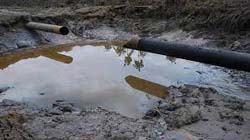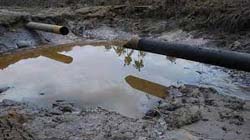Crude oil loss through theft or organised criminal activities is already on the verge of hijacking oil and gas operations in Nigeria. With over 91 per cent loss in some cases, KINGSLEY JEREMIAH, explores some of the options and efforts that may tame the menace.
Activities of pipeline vandals are growing rapidly in Nigeria into a very lucrative business.
The Nigerian Upstream Petroleum Regulatory Commission (NUPRC) said Nigeria lost $3.2 billion in crude oil theft between January 2021 and February 2022. Even as operators, especially the Oil Producers Trade Section and the Independent Petroleum Producers Group (IPPG) are declaring force majeure as over 91 per cent of crude is being lost in some pipelines.
In 2020, the Nigerian Extractive Industry Transparency Initiative (NEITI) said Nigeria’s loss to crude oil theft stands at $4.19 billion yearly. Reportedly, Nigeria is losing over 300,000 barrels of crude oil per day to oil theft, vandalism and other related criminal vices in the country. The implications, according to reports released by NEITI include loss of revenue, environmental disaster, a threat to regional peace and security, the proliferation of arms and a poor investment climate.
As vandals hit pipelines, the nation’s federation account bleeds. Just recently, Nigerian National Petroleum Company (NNPC) Limited reported that N32.56 billion was spent on pipeline security and maintenance due to rising incidents of vandalism and frequency in maintenance.
Now described as ‘organised crime’ and a national disaster and happening more frequently at Bonny Terminal Network, Forcados Terminal Network and Brass Terminal Network, NUPRC believes that inadequate security, poor community engagement, exposed facilities, economic challenges, poor surveillance, stakeholder compromises are among other reasons that continue to escalate crude oil loss.
With the situation going out of hand, business tycoon, Tony Elumelu had recently said: “Businesses are suffering. How can we be losing over 95 per cent of oil production to thieves? Look at the Bonny Terminal which should be receiving over 200,000 barrels of crude oil daily, instead, it receives less than 3,000 barrels, leading the operator, Shell to declare force majeure, which has taken a toll on their businesses.

To put the situation in perspective, a leading geologist and publisher of Africa Oil and Gas Report, Toyin Akinosho explained that the crude oil theft in the country is mainly at the onshore fields and more than 50 per cent of Nigerian production happens offshore, especially shallow water and deep-water.
At the moment, Akinosho said: “The quantum of production onshore is potentially larger than either deep-water output (which is around 38 per cent of our total and shallow water production (which is around 20 per cent. What we are saying, in fact, is that, if it were not for the theft, we could be having over 65 per cent of the country’s output from onshore, as you know percentages are proportional figures.
“There are three main crude oil export pipelines built by Shell. The most notoriously vandalised are the ones in the East: Nembe Creek Trunk Line (NCTL) and The Trans-National Pipeline (TNP). These lines take crude from onshore fields in the eastern Niger Delta to the Bonny Terminal (sort of like the crude oil export hub on the Atlantic Ocean). Some companies pump as much as 60,000 barrels a day and do this for one month (meaning they produce 1.8Million barrels in a month) and only 90,000 barrels make it to the terminal because of theft along the pipeline route. That’s a huge loss in terms of earnings to the company and taxable production to the country.”
Akinsho, who added that Agip’s 92-kilometre Tebidaba to Brass Pipeline is also frequently vandalised, noted that the least vandalised pipelines are the ones in the Western Niger Delta.
But as bleak as the crude oil theft appears to be, stakeholders insisted that there is leeway. Recall that the NUPRC had gathered operators in the sector in Abuja in search of sustainable solutions even as the NNPC had in collaboration with the NUPRC, top security officials and other stakeholders appraised the situation.
Chairman and Chief Executive Officer of NUPRC, Gbenga Komolafe had noted that the stakeholders’ working team, comprising the regulator and operators had been set up in 2021, in an attempt to deliberate on workable solutions to mitigate crude oil losses, identify various responsible parties along the crude oil loss value chain and propose improvement areas for effective surveillance.
Apart from that, he noted that the commission has initiated in collaboration with NNPC Limited and other stakeholders, a Public-Private Partnership Approach to address the challenge of theft/vandalism.
While the Petroleum Industry Act (PIA) was passed last year, Komolafe noted that the implementation of the host community fragment of the bill could be a critical point to douse tension in the region.
With the draft regulations already in place, he noted that there would be further engagements with stakeholders, especially the communities as an awareness campaign is being created, while the government would ensure prompt payment of community contractors on security and surveillance.
Komolafe believes that installation of LACT units, installation of check meters with flow rate and pressure measuring capabilities, engagement of professional and competent entities for pipeline surveillance, pipeline integrity assessment, deployment of available technologies, improved pipeline security and surveillance and effective collaboration with Government security agencies are some key steps that are being taken.
Komolafe, who had noted that the prevailing level of crude oil theft in the country is now a national threat and organised crime, stated that the government is making serious moves to activate the host community fragment of the Petroleum Industry Act.
While the prevailing development has already led most operators to truck crude oil to the terminal, Managing Director of WalterSmith, Chikezie Nwosu, insisted that some options should be discouraged, stressing that the implications could be worse as vandals may begin to come for the tankers.
In trying to describe the worsening theft, he had said: “Supposing my cost of production per barrel is $20 and I’m expecting that barrel to get to the terminal and all that gets to the terminal from that barrel is not more than one barrel, 91 per cent of the barrel is gone and I am left with 0.9 per cent. That actually multiplies my unit cost of production exorbitantly and it just goes through the roof. So in actual fact, my unit cost of production is significantly higher than the oil price overall because the effort I take to produce that barrel remains the same.”
According to him, thumb printing of crude could be a great option as pipelines could also be buried far beyond the surface level to make it very difficult to find their ways even as communities must urgently be separated from the theft to deescalate the situation.
He emphasised the need for metering accuracy, engaging the communities, application of pipeline technology as well as technology for the crude.
Nwosu noted that advance cargo declaration could also be a feasible option as well as fingerprinting of the crude so that the country could combine the solutions together and determine who is stealing the crude.
“With advance cargo declaration, it means that anybody internationally that takes on crude that is not signed off as legally produced but exporting crude in Nigeria is a criminal, and the company can be held liable. There are myriads of solutions that can be done. People talk about burying pipelines, rerouting the pipelines, let’s see what actually works. We need to take action,” Nwosu said.
Chief Executive Officer of NNPC, Mele Kyari had disclosed that the NNPC has strengthened collaboration with the Joint Security Task Force and other stakeholders to tackle oil theft and illegal refineries in Nigeria.
Kyari explained that the scale of crude oil theft and pipeline vandalism seen in the community was beyond explanation, adding that all hands must be on deck to contain the spate of crude oil losses in the country.
He added that through a collaborative effort of the government security agencies, host communities and oil companies operating in the area and with the deployment of the right technology, the menace would be contained.
Expressing optimism on its zeal to put an end to the problem, Kyari underscored the need to intensify security on the ground and deploy modern technology to tackle the menace.
According to the NNPC boss, pipeline vandalism, oil theft and illegal refining activities are threatening the growth of the country’s oil and gas industry.
An operator and former Chairman, Petroleum Technology Association of Nigeria (PETAN), Bank-Anthony Okoroafor described the prevailing situation as “a monumental disaster.”
“If you produce 100 bbl and see only 10 bbls in the terminal, your cost per barrel will be huge. There is also a massive loss of revenue to the Federal Government,” Okoroafor said.
Founder of Nextier, Patrick Okigbo said, with support from a development partner, his organisation had designed a community-based pipeline surveillance system for NNPC showing how to turn the thieves into partners but that the plan was never implemented.
“It is, therefore, no surprise that oil bunkering, which was a festering sore, has become cancer. There is still time to revisit the plan,” he said.
Okigbo said the prevailing situation has increased production costs as the companies would spread their cost over the much lower number of barrels they are able to take to market.
Another energy expert, Michael Faniran, disclosed that one of the greatest challenges facing oil production and distribution and, indeed, the oil and gas industry in the country has been the nefarious activities of oil thieves and vandals.
“This issue poses a huge threat to the economy of the country. Nigeria’s growth and development are linked to petroleum resources. Currently, crude oil exports account for 90 per cent of foreign exchange earnings and makeup about 85 per cent of government revenue.
“Beyond the socio-economic impact of the theft, this also leads to a threat to regional peace and security and also proliferation of arms, among other issues,” Faniran said.






